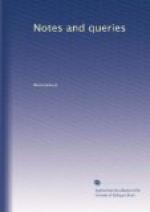QUERIES
JAMES CARKASSE’S LUCIDA INTERVALLA, AN ILLUSTRATION OF PEPYS’ DIARY.
I met lately with a quarto volume of poems printed at London in 1679, entitled:
“Lucida Intevalla
containing divers miscellaneous Poems
written at Finsbury and Bethlem,
by the Doctor’s Patient
Extraordinary.”
On the title-page was written in an old hand the native of the “patient extraordinary” and author James Carkasse, and that of the “doctor” Thomas Allen. A little reading convinced me that the writer was a very fit subject for a lunatic asylum; but at page 5, I met with an allusion to the celebrated Mr. Pepys, which I will beg to quote:—
“Get thee behind me then, dumb devil,
begone,
The Lord hath eppthatha said to my tongue,
Him I must praise who open’d hath
my lips,
Sent me from Navy, to the Ark, by Pepys;
By Mr. Pepys, who hath my rival been
For the Duke’s[3] favour, more than
years thirteen;
But I excluded, he high and fortunate,
This Secretary I could never mate; {88}
But Clerk of th’ Acts, if I’m
a parson, then
I shall prevail, the voice outdoes the
pen;
Though in a gown, this challenge I may
make,
And wager win, save if you can, your stake.
To th’ Admiral I all submit, and
vail—”
The book from which I extract is cropped, so that the last line is illegible. Can the noble editor of Pepys’ Diary, or any of your readers, inform me who and what was this Mr. James Carkasse?
W.B.R.
[Footnote 3: The Duke of York, afterwards James II.]
* * * * *
MINOR QUERIES.
Epigrams on the Universities.—There are two clever epigrams on the circumstance, I believe, of Charles I. sending a troop of horse to one of the universities, about the same time that he presented some books to the other.
The sting of the first, if I recollect right, is directed against the university to which the books were sent, the king—
“—right well discerning,
How much that loyal body wanted learning.”
The reply which this provoked, is an attack on the other university, the innuendo being that the troops were sent there—
“Because that learned body wanted loyalty.”
I quote from memory.
Can any of your readers, through the medium of your valuable paper, favour me with the correct version of the epigrams, and with the particular circumstances which gave rise to them?
J. SWANN.
Norwich.
Lammas Day.—Why was the 1st of August called “Lammas Day?” Two definitions are commonly given to the word “Lammas.” 1. That it may mean Loaf-mass. 2. That it may be a word having some allusion to St. Peter, as the patron of Lambs.




